Campaign Resources (403 found)
Endemic Land Confiscation in Burma: A Major Challenge to the Reform Process
The issue of land confiscation has been and will continue to be one of the largest problems facing Burma. The increase in foreign investment, the liberalization of the economy, and lack of rule of law generally, including both appropriate legislation and an independent judiciary,have resulted in land confiscation on an endemic scale. Thegovernment of Burma has responded […]
• • •Undermining the Peace Process: Burmese Army Atrocities Against Civilians in Putao, Northern Kachin State
Despite ongoing peace negotiations with the Kachin Independence Organization (KIO), in early September 2013 Burmese government troops raided the village of Nhka Ga, near Putao in northern Kachin State, accusing the villagers of supporting the KIA. They detained and tortured ten villagers, shot three men to death, and raped the wife of one of the detainees. The troops have since been encamped in the village, restricting all civilian movement […]
• • •Economics of Peace and Conflict
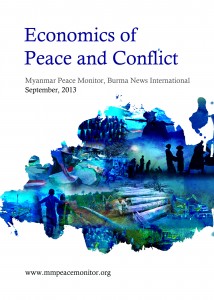 This report aims to clarify the complex processes of solving economic grievances related to the peace process. Examining how these efforts work and how the different actors, policies and projects make up a larger framework may help in assessing how well they respond to the roots of conflict. It especially tries to understand how the many different ministries, committees, international donors, CBOs, businesses (domestic and foreign) and NSAGs work together, overlap, or contradict each other in achieving economic and development goals for national peace […]
This report aims to clarify the complex processes of solving economic grievances related to the peace process. Examining how these efforts work and how the different actors, policies and projects make up a larger framework may help in assessing how well they respond to the roots of conflict. It especially tries to understand how the many different ministries, committees, international donors, CBOs, businesses (domestic and foreign) and NSAGs work together, overlap, or contradict each other in achieving economic and development goals for national peace […]
Disputed Territory: Mon Farmers’ Fight Against Unjust Land Acquisition and Barriers to Their Progress
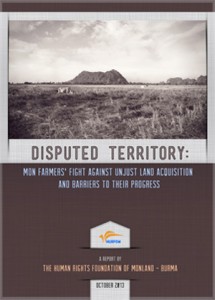 Over the years HURFOM has produced a number of accounts highlighting the hardships faced by Mon farmers who became victims of land confiscation or unjust land acquisition. In this report HURFOM follows-up on previously documented abuses and concentrates on an emerging new trend: farmers’ active and collective pursuits for rights to their land.
Over the years HURFOM has produced a number of accounts highlighting the hardships faced by Mon farmers who became victims of land confiscation or unjust land acquisition. In this report HURFOM follows-up on previously documented abuses and concentrates on an emerging new trend: farmers’ active and collective pursuits for rights to their land.
Disputed Territory aims to elaborate on the activities of and express solidarity with farmers who are resolutely, and in some cases for the first time, seeking justice regarding their land […]
The Use of Section 18 to Continue Human Rights Abuses in Burma
Section 18 of the Peaceful Assembly and Peaceful Procession Law is being frequently utilized to arrest and imprison political activists for undertaking human rights activism in Burma. AAPP (B) wishes to highlight the ongoing human rights abuses section 18 permits and to make the international community aware of the dangers this poses to the political freedom in Burma […]
• • •Mining in Conflict Zones: A New Form of Military Offensive
The Burmese government has been granting mining concessions throughout Karenni state even though no political negotiations to bring about lasting peace have begun with the Karenni resistance forces. This is a ploy to benefit economically from exploitation of local natural resources while strengthening Burmese military control over the Karenni people […]
• • •Corporate Accountability in ASEAN : A Human Rights-Based Approach
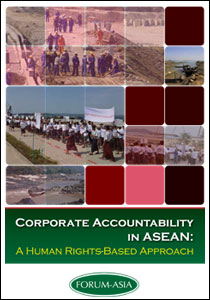 Corporate Accountability in ASEAN: A Human Rights-Based Approach assesses the impacts of business on human rights in the ASEAN sub-region. Originating from cases presented at two public hearings organised by civil society groups in 2011 in response to the ASEAN Intergovernmental Commission on Human Rights (AICHR)’s undertaking of a thematic study on the topic of “corporate social responsibility” (CSR) in ASEAN, this report documents cases of human rights violations in relation to business activities in the sub-region, and demonstrates that voluntary CSR initiatives promoted by businesses – and by ASEAN institutions – are insufficient […]
Corporate Accountability in ASEAN: A Human Rights-Based Approach assesses the impacts of business on human rights in the ASEAN sub-region. Originating from cases presented at two public hearings organised by civil society groups in 2011 in response to the ASEAN Intergovernmental Commission on Human Rights (AICHR)’s undertaking of a thematic study on the topic of “corporate social responsibility” (CSR) in ASEAN, this report documents cases of human rights violations in relation to business activities in the sub-region, and demonstrates that voluntary CSR initiatives promoted by businesses – and by ASEAN institutions – are insufficient […]
Report on the Human Rights Situation in Burma (January 2013 – June 2013)
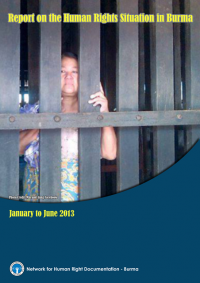 Over the six months from January to June 2013, ND-Burma documented 147 human rights violations across Burma. These violations occurred in areas of armed conflict but also in areas covered by ceasefires. Each violation is a specific incident, but it may involve any number of victims, from one victim of killing, to forced labor involving many victims, to the forced displacement of an entire village. ND-Burma’s findings demonstrate that, despite progress in reaching ceasefire agreements with non-state armed groups, the government has made little progress protecting the human rights of its citizens. Furthermore, continued arrests of human rights defenders demonstrate that the government is not serious about working with civil society to protect human rights […]
Over the six months from January to June 2013, ND-Burma documented 147 human rights violations across Burma. These violations occurred in areas of armed conflict but also in areas covered by ceasefires. Each violation is a specific incident, but it may involve any number of victims, from one victim of killing, to forced labor involving many victims, to the forced displacement of an entire village. ND-Burma’s findings demonstrate that, despite progress in reaching ceasefire agreements with non-state armed groups, the government has made little progress protecting the human rights of its citizens. Furthermore, continued arrests of human rights defenders demonstrate that the government is not serious about working with civil society to protect human rights […]
Drawing The Line: The Case Against China’s Shwe Gas Project, For Better Extractive Industries in Burma
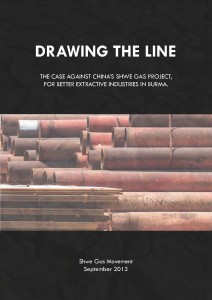 The Shwe Gas project, the largest extractive project in Burma, set to earn US$54 billion for the Burmese government, has just begun transferring Burma’s natural gas to China. As the first such project to become operational under the new quasi-civilian government, its management will set the precedent for how future extractive projects will be carried out as Burma opens up for investment and resource bidding. As it stands, the standard is not good […]
The Shwe Gas project, the largest extractive project in Burma, set to earn US$54 billion for the Burmese government, has just begun transferring Burma’s natural gas to China. As the first such project to become operational under the new quasi-civilian government, its management will set the precedent for how future extractive projects will be carried out as Burma opens up for investment and resource bidding. As it stands, the standard is not good […]
2013 ANNI Report on the Performance and Establishment of National Human Rights Institutions in Asia
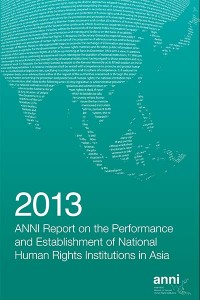 National Human Rights Institutions (NHRIs) have become increasingly prominent actors in the national, regional and international human rights arenas. When able to operate independently and effectively, they are important mechanisms that constitute an effective complement to the judiciary and other institutions in the national infrastructure tasked with the promotion and protection of human rights.
National Human Rights Institutions (NHRIs) have become increasingly prominent actors in the national, regional and international human rights arenas. When able to operate independently and effectively, they are important mechanisms that constitute an effective complement to the judiciary and other institutions in the national infrastructure tasked with the promotion and protection of human rights.
2012 (and significant events in the first half of 2013) represented a litmus test for many NHRIs in the region. There were significant events for Asian states: such as budding attempts towards democratic transition; and states that faced internal conflict or communal violence, among others. Often, this involved the complicity of state actors, which renders the fight against impunity a formidable challenge.
This report includes a chapter entitled “Lost in Transition” that looks at the Myanmar National Human Rights Commission […]

 All posts
All posts